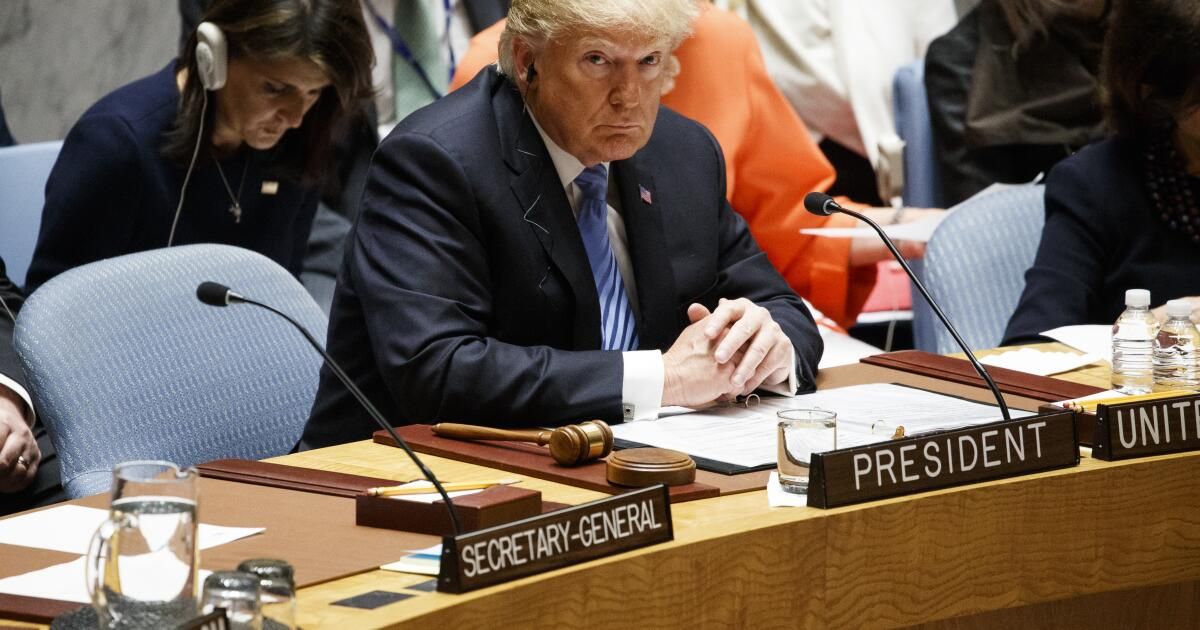Donald Trump was not a champion of responsible global governance in his first term. His withdrawal from multilateral agreements, including the Iran nuclear deal and the Paris climate accords, showed an unusual disdain for international institutions and cooperation. He has little evident respect for the “rules-based international order” favored by the Biden administration. However, therein lies an opportunity.
The idea that the United States defends global stability by leading a “rules-based” order tends to generate more bad will than good will in many parts of the world. Instead of offering a positive American vision, it has come to symbolize American hypocrisy and double standards. Trump would do well to eliminate the phrase from the American lexicon.
The concept of a rules-based order has gained popularity in the D.C. foreign policy establishment, known as the “blob,” in recent years because it sums up how pundits (liberals and neoconservatives alike, many of them surprised by Trump and ousted from power) saw what they and the United States stood for.
The Biden administration made rules-based formulation an organizing principle of its foreign policy. The idea played a key role in shoring up like-minded states to counter China and Russia, which Washington accuses of trying to overturn the current world order. However, the fallacies of the order have been exposed when Washington uses this concept as a weapon against its geopolitical enemies even when, for example, the United States provides weapons to Israel despite its repeated violations of international law.
More importantly, the rules-based concept has masked its own revisionist motivations. The goal of maintaining American dominance of the international system has prevented a functional global legal framework. This risks inciting the formation of numerous competing orders rather than a more collaborative system that follows a single set of laws.
China has accused rules based chat to mask the rule of a single power in the world. However, their response so far has been to operate within the existing system while attempting to reform it to their own liking. But if Biden had succeeded in turning the rules-based international order into a bloc, China could have responded by teaming up with Russia and states in the Global South to form a rival bloc with its own sets of laws.
Although nations in the Global South have disagreements with Russia and China, many are united in their opposition to the rules-based presumption, which they see as designed largely to prolong American unipolarity at the expense of rising powers like Brazil and India. “I am surprised by how much we have lost the trust of the Global South,” French President Emanuel Macron admitted at the 2023 Summit. Munich security conference.
A world in which states no longer differ over competing interpretations of a legal regime but instead offer competing sets of rules is scarier than anything Trump has done so far.
The more the United States and its allies fracture the global and legal order in the name of their rules, the fewer people follow them. We cannot forge an international order by imposing rules on states that have been excluded from its formulation. Not surprisingly, many international law experts see the concept of rules-based order not as a complement to international law, but as a threat to it.
A multi-order world that lacks a framework for compromise, collaboration and de-escalation would fuel great power conflict and competition at a fragile time. It would be less able to contain military aggression, prevent nuclear proliferation, or manage shared crises such as climate change. If great power competition is already occurring, the key question is whether it develops under some common framework or becomes a matter for each great power itself.
That makes Trump's decisions essential. It appears to be open to a multipolar world, although its investment in rules and laws is a different matter. But if you really want to reduce America's global military footprint, bring our troops home, and stop playing the increasingly unwanted role of world police, then avoiding anarchy and promoting peace by maintaining a multilateral system will serve the interests of the United States and, therefore, those of Trump.
Trump is an enthusiastic defender of his own interests. His foreign policy during his first term was marked by a transactionalism that at times allowed him to transcend typical Washington moralizing in favor of promoting American interests through compromises, such as negotiating withdrawal from Afghanistan with the Taliban. This “what's in it for me” approach to world affairs may allow Trump to shed Washington's myths about his coalition-of-the-willing international order.
A functioning world order is an important condition for Trump's apparent foreign policy goals, including winning economic competition with China and forging peace in Ukraine. Those goals cannot be achieved without a healthy and predictable security framework that prevents disagreements and conflicts from escalating into mutually destructive wars.
Some existing norms, laws and institutions foster a range of good outcomes and deserve to remain in place, including the United Nations Charter norms that limit force and the United Nations itself. As for ending the ongoing wars in Ukraine and Gaza, that will depend on the art of the deal. But it all depends on whether the negotiation takes place in the shadow of some belief that it is better to have common and fair rules.
The rules-based international order has betrayed that possibility. Over the next four years, America must do better.
Samuel Moyn is a professor of law and history at Yale.. Trita Parsi leads the Better Order Project at the Quincy Institute, which brought together 130 academics and officials from 40 countries to develop reforms of the multilateral system.












